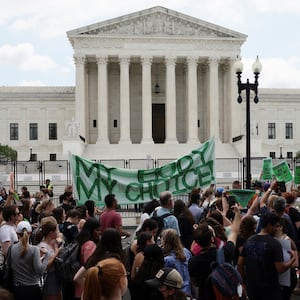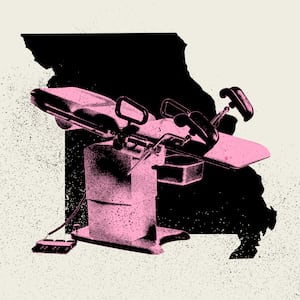Months after the White House promised an “all-of-government approach” to address the looming end of nationwide abortion access, providers, patients, and prosecutors across the country are still waiting for federal guidance on whether the procedure will soon be a crime in their own state.
Legal experts and abortion-rights advocates have been sounding the alarm for months that the nationwide patchwork of pre-Roe v. Wade abortion bans, post-Roe “trigger laws” and other legislation restricting abortion access will lead to legal chaos now that the Supreme Court has struck down the constitutional right to an abortion. As the national grapples with the implications of the nation’s highest court’s decision ruling against abortion access in Dobbs v. Jackson Women’s Health Organization, the Department of Justice has still not issued any public guidance for officials in states where some of those laws are mutually contradictory.
“That’s going to lead to potential chaos, legally,” said Mary Ziegler, a professor at Florida State University College of Law who specializes in the legal history of abortion. “The federal government should intervene in clarifying that.”
On Thursday, Vice President Kamala Harris hosted a meeting with attorneys general from more than a half-dozen states to go over “preliminary discussions” about their powers to protect abortion access. Harris’ meeting with the attorneys general of California, Delaware, Illinois, New York, Nevada, Washington state, and Wisconsin came nearly two months after the bombshell leak of a draft opinion overturning Roe was published by Politico in early May. Only one of these states—Wisconsin—is set to roll back abortion rights in the wake of the ruling.
“I urge the people of our country to know the power that they have to have an impact on how the laws of their state are enforced by paying attention to who their attorney general is and where they stand on this important issue,” Harris said ahead of the meeting. As the top law enforcement officials in their state, Harris said, attorneys general have the responsibility to “[protect] reproductive rights and freedoms.”
But with discussions over how to blunt Dobbs’ effects on abortion access only in private, preliminary stages, many law enforcement officials in states with impending bans have issued conflicting statements about their intention to charge people under criminal codes written decades before Roe v. Wade, the landmark 1973 ruling which determined the ability to end a pregnancy was a constitutional right.
“This uncertainty, and the unwillingness of Wisconsin State Legislature to repeal or criminal abortion bans, is already negatively impacting the health and well-being of our patients,” Mike Murray, the executive director of Planned Parenthood Advocates of Wisconsin, told The Daily Beast. “It is really important for people to take a step back and realize what the stakes are for very real people.”
The discord has already begun spiraling out of control in the Upper Midwest, where the potential enforcement of Michigan and Wisconsin’s blanket pre-Roe abortion bans—passed in 1931 and 1849, respectively—could soon look like Swiss cheese.
“Prosecutors within each state would have to decide for themselves how to exercise discretion in enforcing these laws,” Barbara McQuade, a professor at the University of Michigan Law School who specializes in civil rights, public interest law, and criminal law, told The Daily Beast. “This could lead to the curious result that it may be illegal to obtain an abortion in one county in Michigan, and permissible to obtain one in another.”
McQuade’s hypothetical has already begun to play out ahead of the Supreme Court ruling. After the leaked draft opinion was published, Michigan’s attorney general vowed not to enforce the state’s abortion ban originally signed into law in 1931, which criminalizes administering an abortion as a felony, including in cases of rape and incest. But county prosecutors across the state have varied widely in their response to the upcoming Dobbs ruling, with some pledging not to enforce the ban and others saying that they can’t pick and choose which statutes to obey.
“If it’s on the books, I took an oath of office to uphold the law, the constitution of this state, and the Constitution of the United States," Peter Lucido, the head prosecutor of Macomb County, told a female constituent during a press conference last month. Lucido, who prosecutes crimes in Michigan’s third-largest county, has accused other county prosecutors of attempting to “pick and choose what laws they want to enforce.”
The potential patchwork enforcement of the state’s long-dormant abortion law, a group of prosecutors opposed to the ban wrote in May, has created “a cloud of uncertainty and criminality” over the procedure.
“Put bluntly: A storm is gathering,” the prosecutors said in a motion supporting a lawsuit seeking to overrule the law, telling the court that Michiganders “deserve clarity as to the existence and scope of core constitutional rights.”
The most immediate risk is at the local level, Murray said, where county prosecutors bring the vast majority of a state’s criminal cases and have wide discretion over which ones to pursue. Lawsuits within the state seeking to clarify whether or not Wisconsin’s criminal abortion ban is still viable could take months—with zero legal certainty in the meantime.
“We would need to wait until a court of competent jurisdiction provided clarification about whether or not our criminal abortion ban is enforceable before we could resume providing care to patients,” Murray said, “without being concerned about exposing our healthcare providers to criminal liability.”
Following the oral arguments in Dobbs and the Supreme Court’s refusal to stay a Texas law that deputized citizens to charge abortion providers with a felony, President Joe Biden charged the administration’s White House Gender Policy Council with overseeing “what steps the federal government can take to ensure that women… have access to safe and legal abortions.”
But since then, the Biden administration has refused to elaborate on what those steps might be in a post-Roe America, save for perfunctory calls for Congress to pass the Women’s Health Protection Act, legislation that would codify abortion rights into federal law. Those efforts were futile—although whether the bill was doomed because of the White House’s failure to lobby for it or the White House failed to lobby for it because it was doomed, is a matter of perspective, one administration official told The Daily Beast.
The White House referred requests for comment on post-Roe legal guidelines to the Department of Justice. The DOJ did not respond. But the administration has previously indicated that its refusal to publicly outline a legal response to Dobbs was based on the fact that the specifics of the final ruling remain unknown.
“We’ve said that we weren’t going to preview until there’s a final opinion because we’re still speaking about a potential opinion that has not yet been released,” former White House press secretary Jen Psaki told reporters on May 10, when asked why the administration had refused to communicate the potential options available to patients and providers ahead of the decision. “What we’re looking at and what we’re trying to address is our assessment and understanding of what the impact will be that 13 states have trigger laws, 26 states have indicated that they could overturn or ban or take immediate action should this be the final opinion.”
Some legal experts agreed that, at least publicly, there was limited utility in providing guidelines for state attorneys general on how to navigate the potential enforceability of pre-Roe laws.
“It would be surprising for guidance to be issued before the court hands down the Dobbs opinion,” said Miriam Seifter, a professor of administrative law, constitutional, and state and local government law at the University of Wisconsin.
But the certainty of interstate conflict over abortion means that the Department of Justice will need to weigh in nearly immediately following the Supreme Court’s decision—and likely in the midst of the constitutional equivalent of a five-alarm wildfire.
“If I call someone in Texas and say, ‘hey, I can arrange for your abortion,’ in theory, the long-arm statutes of Texas could reach across borders to me and make me open to being sued,” said Dr. Louise King, an assistant professor of obstetrics, gynecology, and reproductive biology at Harvard Medical School and a gynecologic surgeon at Brigham and Women’s Hospital. “So there’s a lot of problems here.”
Ultimately, Ziegler said, the impending chaos belongs at the feet of Congress.
“The easiest way to create some semblance of sanity would be a federal law that would clearly preempt whatever states are trying to do,” Ziegler said. “But if you have a Senate that doesn’t have the votes, then I just don’t know how much the administration can really do.”
But fingerpointing between the executive, legislative and judicial branches sidesteps the real issue, Murray said.
“There’s unbelievable attention paid to what this means for political battles in Congress or state legislatures,” Murray said. “But the ripple effect of those fights impacts very real people that we all know and care about—not just points on a scoreboard.”








